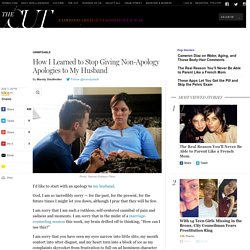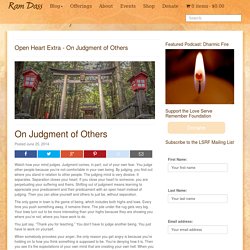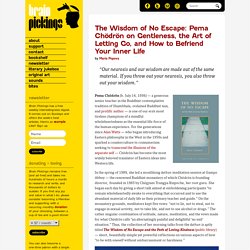

How I Stopped Giving Non-Apology Apologies. I’d like to start with an apology to my husband.

God, I am so incredibly sorry — for the past, for the present, for the future times I might let you down, although I pray that they will be few. I am sorry that I am such a ruthless, self-centered cannibal of pain and sadness and moments. I am sorry that in the midst of a marriage-counseling session this week, my brain drifted off to thinking, “How can I use this?” I am sorry that you have seen my eyes narrow into little slits, my mouth contort into utter disgust, and my heart turn into a block of ice as my complaints skyrocket from frustration to full-on ad hominem character assassination. And I am sorry for being such a terrible apologizer. This is an apology for all previous apologies. They are garbage. You know I am a big fan of the self-help classic The Five Love Languages, and I maintain that it’s excellent for understanding what makes your partner tick. The book outlines different strategies for remorse.
“Express regret.” On Judgment of Others. Watch how your mind judges.

Judgment comes, in part, out of your own fear. You judge other people because you’re not comfortable in your own being. By judging, you find out where you stand in relation to other people. The judging mind is very divisive. It separates. The only game in town is the game of being, which includes both highs and lows. You just say, “Thank you for teaching.”
When somebody provokes your anger, the only reason you get angry is because you’re holding on to how you think something is supposed to be. . – Ram Dass Help Support These Teachings If you enjoyed On Judgment of Others, please support our efforts to continue making teachings from Ram Dass and friends accessible to all. I would like to make a contribution of: Please do not use the back button or click submit more than once while your order is processing. If you would like to donate via mail, please send a check to:Love Serve Remember Foundation2355 Westwood Blvd. #130Los Angeles, CA 90064. Who's to blame for this mess? Forgiveness: A Time to Love and a Time to Hate : PBS. Divided into two 90-minute acts, Forgiveness: A Time to Love and a Time to Hate premiered April 2011.

About the Program In the PBS film Forgiveness: A Time to Love and a Time to Hate, acclaimed writer, producer and director Helen Whitney explores a compelling range of stories, from personal betrayal to global reconciliation after genocide. 9 Steps » Forgive for good. What is forgiveness - Forgiveness Institute. To understand what forgiveness is, it is important to consider what forgiveness is not .

The act of forgiveness does not suggest you have forgotten the injustice. Nor does it imply you condone or excuse the wrongdoer. You are not condemning; that only leads to forgiveness that stems from moral superiority. What’s more, you are not seeking justice or compensation. When you forgive someone who has deeply hurt you, you let go of resentment and the urge to seek revenge, no matter how deserving of these things the wrongdoer may be. Forgiveness and the Freedom of Letting go. How To Be Compassionate: 3 Research-Backed Steps To A Happier Life. Science points to a crazy number of benefits from being more compassionate: Not too shabby.

Which raises a good question: if it does all this great stuff, why the heck aren’t we more compassionate? The World Is Working Against You Our lives are a lot more focused on numbers and economics than love and compassion these days. Everything is dollars and cents, hours and minutes. Economics is an incredibly powerful tool but when you assign a price to everything and dismiss feelings, you can enter dangerous territory. I’m sure some of you think this is naive or silly. The Google Ngram viewer is an amazing tool that allows us to look at how often terms have been mentioned in books over the past few hundred years. How does “economic” fare against “moral” and “compassion” lately? Are we focused on our compassionate ethical duties to one another? Are we thinking more about principles and charity — or markets? (For more on how giving can make you more successful, click here.)
Grandmom does. The Wisdom of No Escape: Pema Chödrön on Gentleness, the Art of Letting Go, and How to Befriend Your Inner Life. By Maria Popova “Our neurosis and our wisdom are made out of the same material.

If you throw out your neurosis, you also throw out your wisdom.” Pema Chödrön (b. July 14, 1936) — a generous senior teacher in the Buddhist contemplative tradition of Shambhala, ordained Buddhist nun, and prolific author — is one of our era’s most tireless champions of a mindful wholeheartedness as the essential life-force of the human experience.